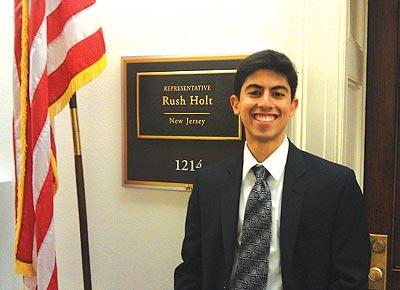
In the third part of a series on Indian Americans who have won the George Marshall Scholarship in 2012, Arthur J Pais profiles Rahul Rekhi, a biomedical engineering graduate who wants to revolutionise healthcare and find ways to tackle diseases like cancer and stroke.
Part I: He won a scholarship for his HIV activism in the US
Part II: Meet the Marshall scholar who wants to uplift slum dwellers
Having earlier received prestigious scholarships given to public service-minded student leaders -- the Barry M Goldwater Scholarship in 2011 and a 2012 Harry S Truman Scholarship -- Rahul Rekhi is now a Marshall Scholar.
Rekhi, who is majoring in bioengineering and economics at Rice University, Houston, will use the scholarship to complete a master's in international health policy at the London School of Economics and a master's in bioengineering at Oxford University.
"In a way," he said, "winning these fellowships is about looking beyond them, because doing so requires that one's aspirations be higher than the self. It's all too easy to be caught up in the minutiae of applying and interviewing, but if you just focus on articulating and acting on what you believe in, the recognition will inevitably follow."
Students begin preparing for prestigious scholarships, which generally include an interview by a panel, more than a year before the deadline.
"A common mistake applicants make is to guess what the panel is expecting from them," Rekhi said. "If you are an artist, you should be able to share your vision through your essays and interview with the panel. Don't feel inadequate of not knowing enough science."
Students should also remember in competing for scholarships that it is a team effort, he said.
"Your preparation should include a team that also has your professors in it," he explained.
"They should guide you and make you prepare well. Some time spent with your professors outside the classroom, even in a college cafeteria, will be very useful."
The Marshall interview panel comprised scientists, social scientists and historians, many of them past Marshall Scholars, and a couple of high-ranking British consular officials, Rekhi said.
"The process of applying for a highly competitive scholarship is also a process of learning things about yourself," Rekhi continued. "You should have a firm vision and present it well in your essays and at the interview."
Rekhi, a health researcher, said he looks beyond his city of Houston, the state of Texas, and even America.
"I am one with a global vision," he said. "As a researcher and policymaker, I want to bring about change in the health systems worldwide."
He looks at the scholarships he has won as investments. "We should leverage them in preparing to be professionals who will make a difference to the world community."
The past summer he worked in Malawi with Beyond Traditional Borders to field-test and implement global health technologies. He is also a recipient of the Rice Envision Grant and the Community Service Grant to create the Research Mentorship Initiative, which pairs underserved students at Houston's Milby High School on research projects with Rice undergraduates.
"I'm very excited by the opportunity to conduct cutting-edge translational research at Oxford's Institute of Biomedical Engineering, where scientists, engineers and physicians from around the world collaborate to develop the next generation of therapeutic technologies," Rekhi said.
"I'm a big believer in the potential for this interdisciplinary, transnational approach to help tackle complex diseases like cancer and stroke."
He is also a big believer in getting a new voice in health policy debate -- the youth.
'Ultimately, the status of each of these pending, long-term policy dilemmas won't impact the lives of the leading generation -- it will affect the ones to follow,' he wrote in his Marshall essay.
"And yet, in virtually all representative bodies, the presence of the latter is effectively nonexistent. Consider the so-called Department of Health and Human Services' Federal Advisory Committees, or Faces -- advisory councils that bring public and private perspectives together to provide input on matters of health-care policy..."
"By and large, they are missing one crucial ingredient of the grander melting pot that is America: youth. The very group that stands to be principally affected by the implementation of health reform is also the one most woefully underrepresented in the decision-making processes."
Rekhi, who grew up in a small Texas city of Katy before moving to Rice, has been a believer in youth power from his early college days.
"Numerous studies and surveys have demonstrated the assets Millennials bring to the table -- the benefits of youth representation on the, well, not-young," he said.
"Not to mention, the so-called Generation Y is more passionate about government than any previously; it is critical that we tap into this base of impassioned, creative energy to shape our health-care paradigm going forward -- a group that often possesses singular expertise in technology, social media, and community outreach."
He knows from personal experience the impact youth can make.
"My previous projects in the Roosevelt Network include developing health-care toolkits with Young Invincibles, composing a national youth health advocacy guide with Families USA, and crafting health reform policy on the Budget for Millennial America project," he said.
"Each of these diverse projects exhibited the extraordinary potential of students and young adults to uniquely shape American health-care for the better."
Rekhi paired with the nonprofit Young Invincibles to distribute a health-care tool kit to more than 3,00,000 graduating college seniors.
"Even as I grow older," he said, "I shall remember to work with the young."